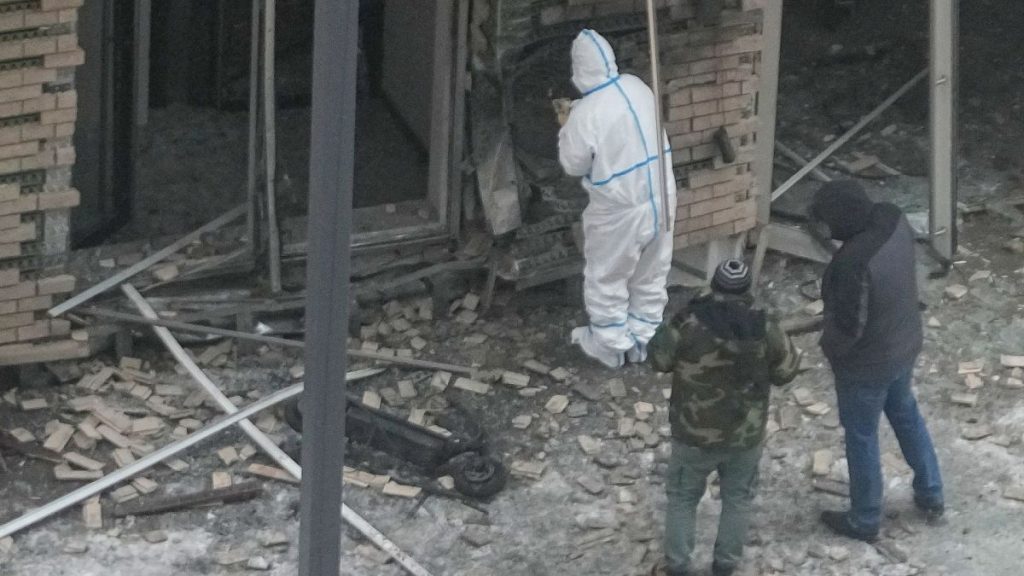The Russian Federal Security Service (FSB) has announced the arrest of four Russian nationals accused of plotting to assassinate high-ranking officials within the Russian Ministry of Defence. This revelation comes just days after the assassination of Lieutenant General Igor Kirillov, a prominent figure in the Russian military, in a bomb attack claimed by Ukraine. The timing of these arrests underscores the escalating tensions between Russia and Ukraine, with the conflict now visibly spilling onto Russian soil. The FSB, the primary successor to the Soviet-era KGB, alleges the suspects were collaborating with Ukrainian intelligence services and planning to utilize methods including a car bomb detonated remotely and an explosive device concealed within an envelope. While the identities of the intended targets remain undisclosed, the FSB’s assertion of a Ukrainian-backed plot adds another layer of complexity to the ongoing conflict.
The FSB’s announcement is accompanied by a released video depicting the arrest and interrogation of the suspects, though their identities remain withheld. The video’s release serves as a public demonstration of the FSB’s response to the alleged plot, potentially intended to project an image of strength and control within Russia. The arrests follow closely on the heels of the assassination of Lieutenant General Kirillov, who was killed by an explosive device planted on an electric scooter outside his Moscow apartment building. This attack, which also claimed the life of Kirillov’s assistant, represents a significant escalation in the conflict, bringing the war directly to the Russian capital and raising serious questions about the efficacy of Russian security measures.
The death of Lieutenant General Kirillov, a key figure responsible for protecting the Russian military against nuclear, chemical, and biological threats, is a significant blow to the Russian military establishment. His role as head of the Radiation, Biological and Chemical Protection Forces highlights the importance of his position within the Russian defence apparatus. The attack on Kirillov, successfully executed within Moscow, underscores the vulnerability of even high-ranking officials and raises concerns about the potential for further attacks within Russia. Ukraine’s claim of responsibility for the assassination further intensifies the conflict and marks a bold move in targeting senior Russian military personnel.
The FSB has also reported the arrest of a suspect in connection with Kirillov’s assassination, identified as a citizen of Uzbekistan. The agency claims this individual confessed to being recruited by Ukrainian special services, further solidifying the FSB’s narrative of Ukrainian involvement in the plot. This confession, if genuine, provides further evidence of Ukraine’s willingness to conduct operations within Russian territory and target high-value individuals. The involvement of a foreign national in the assassination also raises questions about the extent of Ukraine’s intelligence network and its ability to recruit individuals within Russia or neighbouring countries.
Russian President Vladimir Putin has publicly condemned Kirillov’s assassination, characterizing it as a “major blunder” by the nation’s security agencies. This statement reflects the seriousness with which the Kremlin views the incident and the potential embarrassment it poses to the Russian security apparatus. Putin’s call for improved security measures and learning from the incident highlights the pressure on the FSB to prevent future attacks and demonstrate its effectiveness in protecting high-ranking officials and national security interests. The assassination and subsequent arrests underscore the increasing complexity and volatility of the conflict between Russia and Ukraine, with potential for further escalation and unpredictable consequences.
The confluence of these events – the arrests of the four suspects allegedly plotting assassinations, the assassination of Lieutenant General Kirillov, and the subsequent arrest of a suspect linked to Ukrainian intelligence – paints a picture of escalating tensions and a deepening conflict. These incidents represent a significant shift in the dynamics of the war, bringing the fight directly to Moscow and raising concerns about the security situation within Russia. The public nature of these events and the pronouncements by both Russian and Ukrainian authorities indicate a hardening of positions and a willingness to engage in more direct and potentially dangerous confrontations. The potential for further escalation and the uncertain trajectory of the conflict remain significant concerns.

